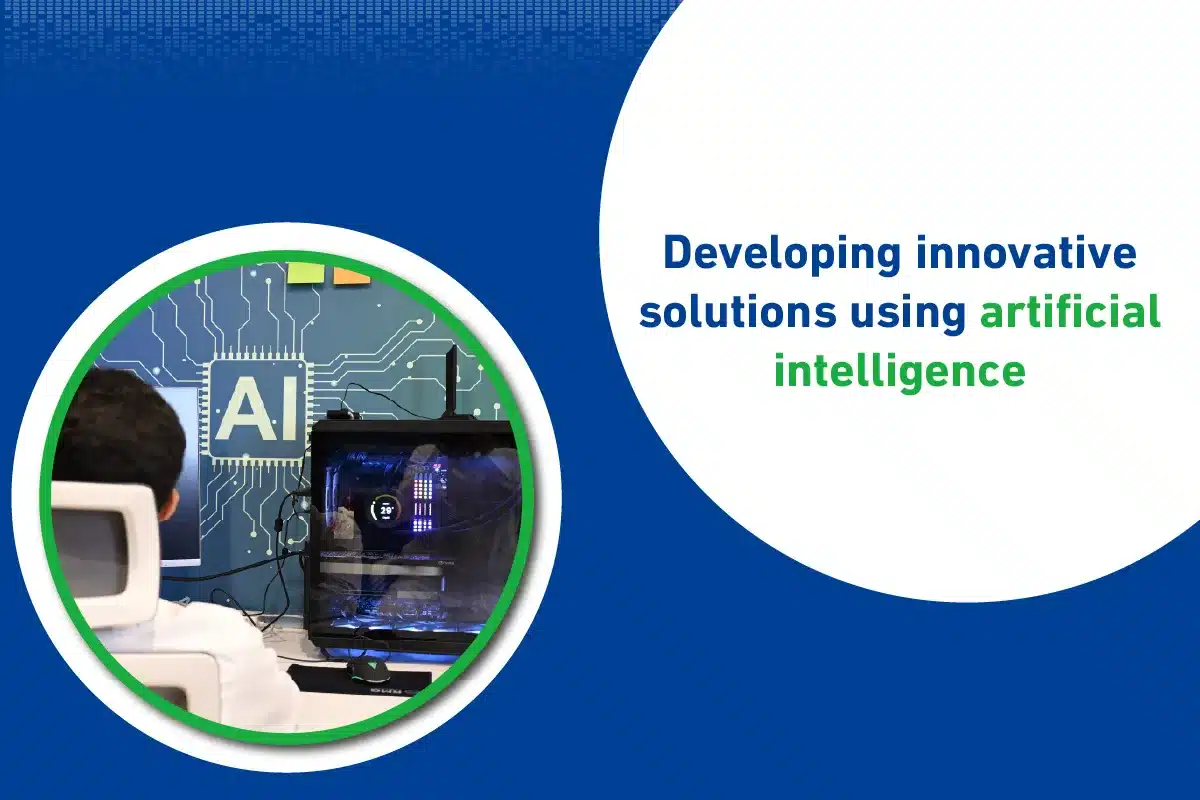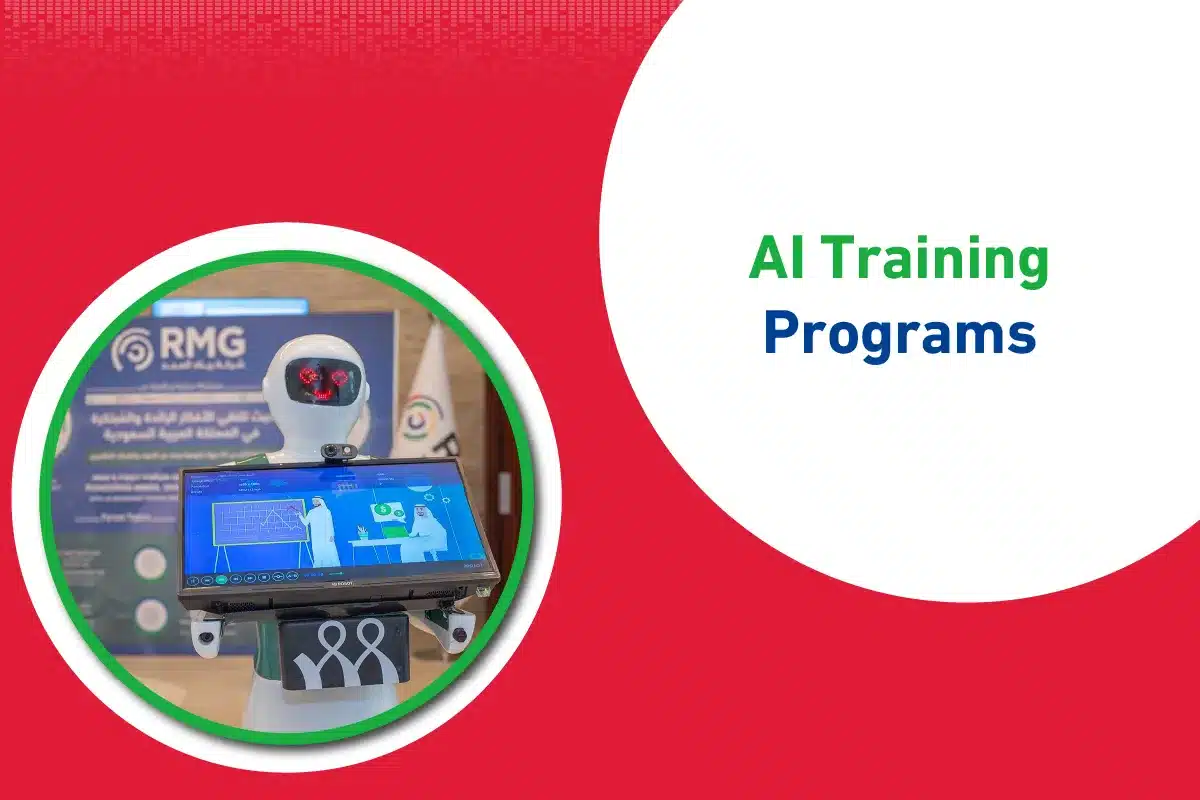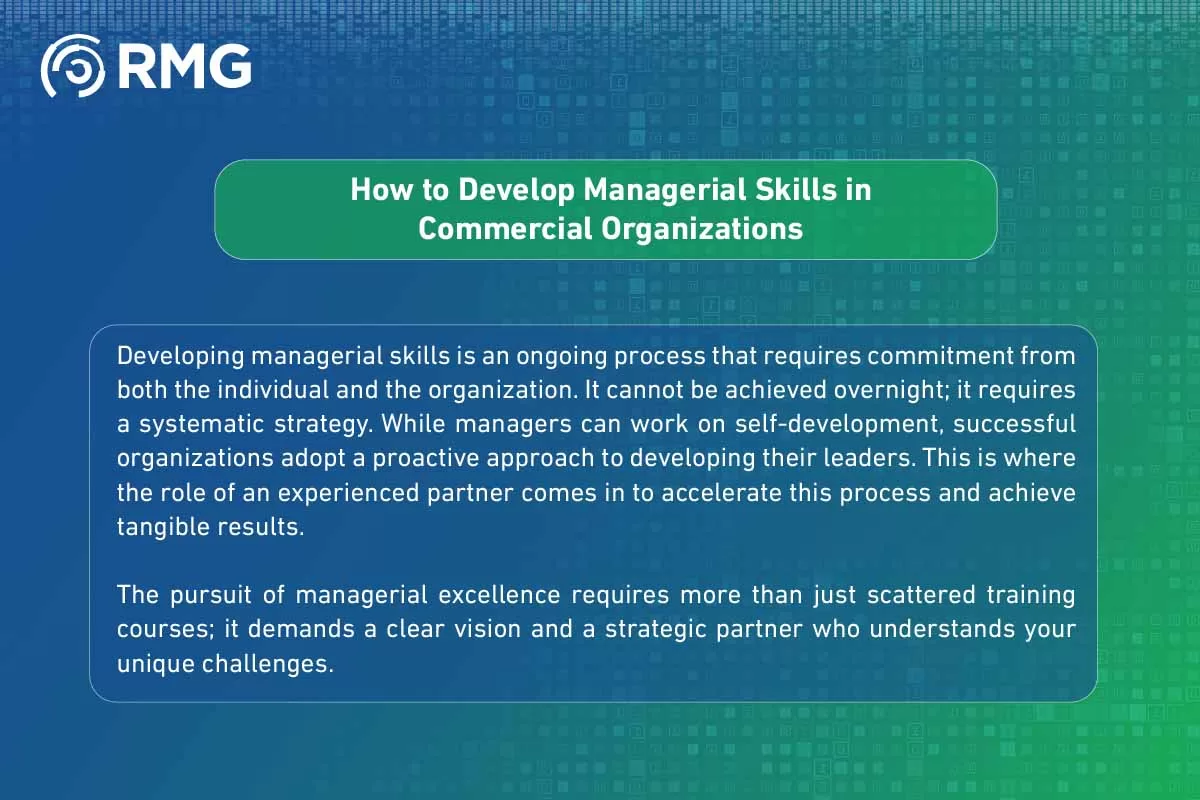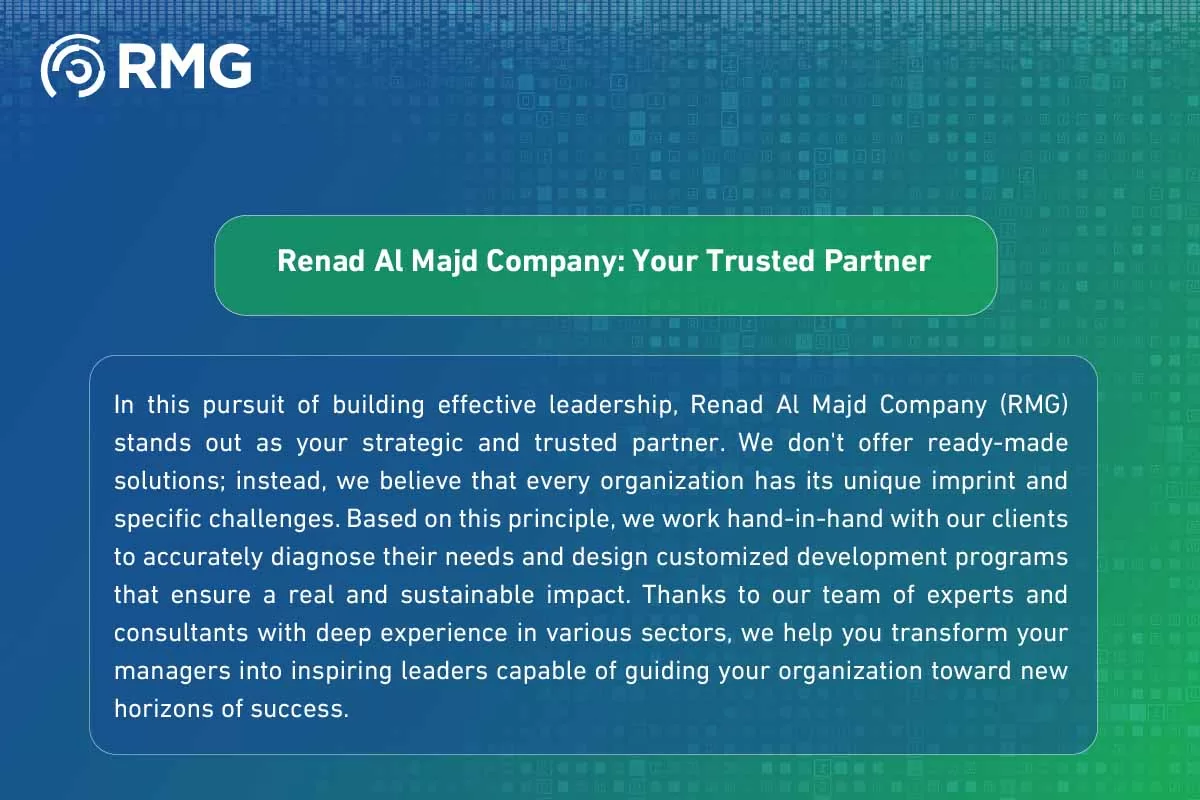Blog Body
Discover the comprehensive guide to managerial skills, their types, and their importance for your organization’s success. Learn how to develop them with the experts at Renad Al Majd Consulting and Training to achieve excellence and market leadership.
In today’s highly competitive and rapidly changing business world, management is no longer just a position or a title; it has become an art and a science based on a comprehensive set of capabilities and competencies. The difference between organizations that thrive and those that struggle to survive often lies in the quality of their leadership. Here, managerial skills emerge as the cornerstone upon which sustainable organizational success is built. A successful manager is not just someone who issues orders; they are an inspiring leader, a strategic planner, a motivator of energies, and an expert problem-solver.
This article is your comprehensive guide to exploring the world of managerial skills. We’ll delve into their concept, uncover their vital importance, identify their types and key examples, and finally, provide a practical roadmap for developing them within your organization in collaboration with your trusted partner, Renad Al Majd Company.
The Concept of Managerial Skills
Before delving into the details of the types and importance of these skills, it’s essential to establish a clear and specific definition for them. The concept of Managerial Skills refers to a set of acquired knowledge, abilities, and behaviors that enable an individual to perform their managerial and leadership tasks effectively and efficiently. They are not merely innate abilities; rather, they are competencies that can be learned, refined, and developed through practice, training, and guidance.
These skills go beyond simply performing technical tasks to include the ability to deal with human elements, understand the organization’s big picture, and make sound strategic decisions. They can be viewed as the tools a manager uses to accomplish four main managerial functions: planning, organizing, directing, and controlling. A manager who masters these skills can transform visions into tangible reality and motivate their team to achieve goals that exceed expectations.
The Importance of Managerial Skills
Investing in the development of managerial skills is not a luxury; it is a critical strategic necessity that ensures an organization’s growth and continuity. Their importance is evident in several vital aspects:
- Achieving Organizational Goals: Skilled managers are the link between top management strategies and on-the-ground execution. They translate grand objectives into clear, actionable plans and ensure that resources and efforts are directed toward achieving them.
- Increasing Productivity and Efficiency: When a manager possesses planning and organizational skills, they ensure the optimal use of available resources (human, financial, material), which reduces waste and increases operational efficiency, directly reflecting on the productivity of the team and the organization as a whole.
- Improving the Work Environment and Boosting Morale: A manager who masters human skills and effective communication creates a positive and motivating work environment. Employees feel appreciated and respected, and their loyalty and belonging to the organization increase, which reduces employee turnover and attracts top talent.
- Making Sound Decisions: In a business environment full of variables, the ability to make quick and well-thought-out decisions is a crucial skill. Managers equipped with analytical and conceptual skills can evaluate different alternatives, anticipate outcomes, and choose the best course of action for the organization.
- Effectively Managing Change: Change is the only constant in the business world. Skilled managers do not fear change; they lead it. They have the ability to convince their teams of the necessity of change, overcome natural resistance, and guide the organization toward adaptability, innovation, and prosperity under new circumstances.
- Building Future Leaders: A successful manager does not only manage their current team; they invest in developing their individuals. Through effective delegation, guidance, and training, they build a second line of leaders, ensuring the continuity of success and the inheritance of expertise within the organization.
Types of Managerial Skills
Organizational sociologist “Robert Katz” classified managerial skills into three main types, a classification still widely adopted today because it covers various aspects of managerial work.
- Technical Skills: This refers to specialized knowledge and expertise in a specific work area. It includes the ability to use tools, techniques, and procedures related to a particular function. For example, an accounting department manager possesses technical skills in preparing financial statements and financial analysis, while an IT department manager possesses technical skills in network administration and programming. These skills are more critical at lower management levels (such as supervisors and team leaders) who directly oversee execution.
- Human Skills: Also known as interpersonal skills or people skills. This is the ability to work effectively with people, whether as individuals or as part of a team. These skills include communication, motivation, leadership, relationship building, conflict resolution, and empathy. A manager with strong human skills can understand their team’s motivations and create an atmosphere of trust and cooperation. These skills are equally vital at all managerial levels, from top to bottom.
- Conceptual Skills: This is the ability to see the organization as a holistic system and understand the complex relationships between its various parts. These skills include strategic thinking, analysis, complex problem-solving, and creativity. A manager with high conceptual skills can understand how a decision made in one department affects the rest of the organization and how the organization interacts with its external environment (competitors, market, economy). The importance of these skills increases significantly as one moves up the managerial hierarchy, where they are crucial for the success of top management.
Examples of Managerial Skills
To make the concept clearer, here are some practical examples of essential managerial skills that every leader should strive to possess:
- Strategic Planning Skills: The ability to define long-term vision and goals, analyze the internal and external environment (SWOT Analysis), and develop measurable action plans.
- Decision-Making Skills: The ability to gather information, analyze alternatives, assess risks, and choose the optimal solution at the right time.
- Effective Communication Skills: Not limited to speaking clearly, but also includes active listening, providing constructive feedback, professional written communication, and understanding body language.
- Leadership and Motivation Skills: Inspiring and guiding the team towards a common goal, creating a positive work environment, recognizing achievements, and understanding the individual needs of employees.
- Time and Priority Management Skills: The ability to identify urgent and important tasks, allocate time effectively, and avoid procrastination to ensure goals are met on time.
- Delegation Skills: Trusting team members and assigning them tasks and responsibilities appropriate to their abilities, while providing necessary support and follow-up, which frees up the manager’s time to focus on strategic tasks.
- Problem-Solving and Conflict Resolution Skills: The ability to identify the root causes of problems, develop innovative solutions, and intervene as a neutral mediator to constructively resolve disputes among team members.
- Emotional Intelligence: Understanding and managing your own emotions, recognizing and positively influencing the emotions of others, which enhances relationships and builds trust.
How to Develop Managerial Skills in Commercial Organizations:
Developing managerial skills is an ongoing process that requires commitment from both the individual and the organization. It cannot be achieved overnight; it requires a systematic strategy. While managers can work on self-development, successful organizations adopt a proactive approach to developing their leaders. This is where the role of an experienced partner comes in to accelerate this process and achieve tangible results.
The pursuit of managerial excellence requires more than just scattered training courses; it demands a clear vision and a strategic partner who understands your unique challenges.
Renad Al Majd Company: Your Trusted Partner
In this pursuit of building effective leadership, Renad Al Majd Company (RMG) stands out as your strategic and trusted partner. We don’t offer ready-made solutions; instead, we believe that every organization has its unique imprint and specific challenges. Based on this principle, we work hand-in-hand with our clients to accurately diagnose their needs and design customized development programs that ensure a real and sustainable impact. Thanks to our team of experts and consultants with deep experience in various sectors, we help you transform your managers into inspiring leaders capable of guiding your organization toward new horizons of success.
Renad Al Majd Company Services
To enable your organization to build a first-class managerial cadre, Renad Al Majd Company offers a comprehensive package of services specifically designed to develop managerial skills at all levels:
- Specialized Management Consulting: We analyze your current organizational structure, evaluate leadership competencies, and provide strategic recommendations to build a high-performing management system that aligns with your business objectives.
- Training Programs and Interactive Workshops: We design and implement customized training programs that cover all aspects of managerial skills, from strategic planning and transformational leadership to emotional intelligence and remote team management. Our workshops are interactive and based on practical case studies to ensure the application of acquired knowledge.
- Executive Coaching Programs: We provide individual coaching sessions for managers and executive leaders to help them identify their strengths and areas for development, and to create personalized action plans to overcome challenges and achieve their maximum leadership potential.
- Performance Evaluation and Competency Development (360-Degree Feedback): We use advanced evaluation tools such as 360-degree feedback to provide a comprehensive view of a manager’s performance from the perspective of their superiors, peers, and subordinates, providing an objective basis for identifying development needs.
- Talent Management System Design and Succession Planning: We help you identify and nurture promising leadership talent within your organization and establish clear plans to qualify them for senior management positions in the future, ensuring leadership continuity.
Contact Our Team Today to Start a Dialogue About the Future of Your Leadership and Your Organization!
Investing in your leaders is the best investment in your organization’s future. Success does not come by chance; it is the result of wise leadership, a motivated team, and a clear strategic vision.
We invite all organizations, companies, and entities that aspire to achieve operational excellence and market leadership to contact us at Renad Al Majd Company. Let us be your partners in the journey of building and developing managerial skills within your teams. Together, we can design the exact solutions you need to turn challenges into opportunities and achieve sustainable growth and a true competitive advantage.






















